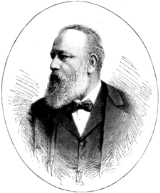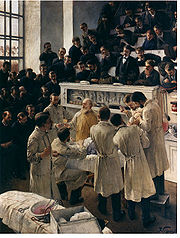
Theodor Billroth
Encyclopedia

Bergen auf Rügen
Bergen auf Rügen is the capital of the former district of Rügen in the middle of the island of Rügen in Mecklenburg-Vorpommern, Germany. Since 1 January 2005, Bergen has moreover been the administrative seat of the Amt of Bergen auf Rügen, which with a population of over 23,000 is...
in the Kingdom of Prussia
Kingdom of Prussia
The Kingdom of Prussia was a German kingdom from 1701 to 1918. Until the defeat of Germany in World War I, it comprised almost two-thirds of the area of the German Empire...
– 6 February 1894) was a German
Germany
Germany , officially the Federal Republic of Germany , is a federal parliamentary republic in Europe. The country consists of 16 states while the capital and largest city is Berlin. Germany covers an area of 357,021 km2 and has a largely temperate seasonal climate...
-born Austria
Austria
Austria , officially the Republic of Austria , is a landlocked country of roughly 8.4 million people in Central Europe. It is bordered by the Czech Republic and Germany to the north, Slovakia and Hungary to the east, Slovenia and Italy to the south, and Switzerland and Liechtenstein to the...
n surgeon
Surgeon
In medicine, a surgeon is a specialist in surgery. Surgery is a broad category of invasive medical treatment that involves the cutting of a body, whether human or animal, for a specific reason such as the removal of diseased tissue or to repair a tear or breakage...
and amateur musician.
As a surgeon, he is generally regarded as the founding father of modern abdominal surgery
Abdominal surgery
The term abdominal surgery broadly covers surgical procedures that involve opening the abdomen. Surgery of each abdominal organ is dealt with separately in connection with the description of that organ Diseases affecting the abdominal cavity are dealt with generally under their own names The term...
. As a musician, he was a close friend and confidante of Johannes Brahms
Johannes Brahms
Johannes Brahms was a German composer and pianist, and one of the leading musicians of the Romantic period. Born in Hamburg, Brahms spent much of his professional life in Vienna, Austria, where he was a leader of the musical scene...
, a leading patron of the Viennese musical scene, and one of the first to attempt a scientific analysis of musicality.
Education
Billroth went to school in GreifswaldGreifswald
Greifswald , officially, the University and Hanseatic City of Greifswald is a town in northeastern Germany. It is situated in the state of Mecklenburg-Vorpommern, at an equal distance of about from Germany's two largest cities, Berlin and Hamburg. The town borders the Baltic Sea, and is crossed...
, and afterwards enrolled himself at the University of Greifswald to study medicine. He then followed his professor, Wilhelm Baum, to the University of Göttingen, and completed his medical doctorate at the University of Berlin. Along with Rudolph Wagner (1805–1864) and Georg Meissner
Georg Meissner
Georg Meissner was a German anatomist and physiologist born in Hannover.He studied medicine at the University of Göttingen, where he worked closely with Rudolf Wagner . In 1851 he accompanied Wagner and Theodor Billroth on an expedition to Trieste, where he performed scientific studies of torpedo...
(1829–1905), Billroth went to Trieste
Trieste
Trieste is a city and seaport in northeastern Italy. It is situated towards the end of a narrow strip of land lying between the Adriatic Sea and Italy's border with Slovenia, which lies almost immediately south and east of the city...
to study the torpedo fish.
Surgery
Billroth worked as a doctor from 1853-1860 at the CharitéCharité
The Charité - Universitätsmedizin Berlin is the medical school for both the Humboldt University and the Free University of Berlin. After the merger with their fourth campus in 2003, the Charité is one of the largest university hospitals in Europe....
in Berlin. In Berlin he was also apprenticed to Carl Langenbuch. From 1860-1867 he was Professor at the University of Zurich
University of Zurich
The University of Zurich , located in the city of Zurich, is the largest university in Switzerland, with over 25,000 students. It was founded in 1833 from the existing colleges of theology, law, medicine and a new faculty of philosophy....
and director of the surgical hospital and clinic in Zurich. While in Zurich, Billroth published his classic textbook Die allgemeine chirurgische Pathologie und Therapie (General Surgical Pathology and Therapy) (1863). At the same time he introduced the concept of audits, publishing all results, good and bad, which automatically resulted in honest discussion on morbidity, mortality, and techniques - with resultant improvement in patient selection. He was appointed professor of surgery at the University of Vienna
University of Vienna
The University of Vienna is a public university located in Vienna, Austria. It was founded by Duke Rudolph IV in 1365 and is the oldest university in the German-speaking world...
in 1867 and practiced surgery as chief of the Second Surgical Clinic at the Allgemeine Krankenhaus (Vienna General Hospital).
He was directly responsible for a number of landmarks in surgery, including the first esophagectomy
Esophagectomy
Esophagectomy or Oesophagectomy is the surgical removal of all or part of the esophagus .-Purpose:...
(1871), the first laryngectomy
Laryngectomy
Laryngectomy is the removal of the larynx and separation of the airway from the mouth, nose and esophagus. The laryngectomee breathes through an opening in the neck, a stoma. This procedure is usually performed in cases of laryngeal cancer...
(1873), and most famously, the first successful gastrectomy
Gastrectomy
A gastrectomy is a partial or full surgical removal of the stomach.-Indications:Gastrectomies are performed to treat cancer and perforations of the stomach wall....
(1881) for gastric cancer, after many ill-fated attempts. Legend has it that Billroth was nearly stoned to death in the streets of Vienna when his first gastrectomy patient died after the procedure.
Billroth was instrumental in establishing the first modern school of thought in surgery
Surgery
Surgery is an ancient medical specialty that uses operative manual and instrumental techniques on a patient to investigate and/or treat a pathological condition such as disease or injury, or to help improve bodily function or appearance.An act of performing surgery may be called a surgical...
. Among his disciples were luminaries such as Alexander von Winiwarter
Alexander von Winiwarter
Alexander von Winiwarter was an Austrian-Belgian surgeon who was a native of Vienna. He was the brother of physician Felix von Winiwarter ....
, Jan Mikulicz-Radecki
Jan Mikulicz-Radecki
Jan Mikulicz-Radecki was a Polish-Austrian surgeon. He was born May 16, 1850 in Czernowitz in the Austrian Empire and died June 4, 1905 in Breslau, German Empire .While his mother Freiin von Damnitz was Austrian, his parental ancestors of the Mikulicz...
and John B. Murphy. William Halsted's pioneer surgical residency
Residency (medicine)
Residency is a stage of graduate medical training. A resident physician or resident is a person who has received a medical degree , Podiatric degree , Dental Degree and who practices...
program was greatly influenced by Billroth's own methods of surgical education.
Music
Billroth was a talented amateur pianist and violinist. He met Brahms in the 1860s, when the composer was a rising star of the Viennese musical scene. They became close friends and shared musical insights. Brahms frequently sent Billroth his original manuscripts in order to get his opinion before publication, and Billroth participated as a musician in trial rehearsals of many of Brahms' chamber works before their first performances. Brahms dedicated his first two string quartets, Opus 51, to Billroth.Billroth and Brahms, together with the acerbic and influential Viennese music critic Eduard Hanslick
Eduard Hanslick
Eduard Hanslick was a Bohemian-Austrian music critic.-Biography:Hanslick was born in Prague, the son of Joseph Adolph Hanslick, a bibliographer and music teacher from a German-speaking family, and one of his piano pupils, the daughter of a Jewish merchant from Vienna...
, formed the core of the musical conservatives who opposed the innovations of Richard Wagner
Richard Wagner
Wilhelm Richard Wagner was a German composer, conductor, theatre director, philosopher, music theorist, poet, essayist and writer primarily known for his operas...
and Franz Liszt
Franz Liszt
Franz Liszt ; ), was a 19th-century Hungarian composer, pianist, conductor, and teacher.Liszt became renowned in Europe during the nineteenth century for his virtuosic skill as a pianist. He was said by his contemporaries to have been the most technically advanced pianist of his age...
. In the conflict, known as the War of the Romantics
War of the Romantics
The War of the Romantics is a term used by music historians to describe the aesthetic schism among prominent musicians in the second half of the 19th century. Musical structure, the limits of chromatic harmony, and program music versus absolute music were the principal areas of contention. The...
, Billroth supported Brahms, but was always fair and measured in his comments. "Wagner was indeed a very considerable talent in many directions," he wrote in 1888.
Billroth started an essay called "Wer ist musikalisch?" ("Who is musical?"), which was published posthumously by Hanslick. It was one of the earliest attempts to apply scientific methods to musicality. In the essay, Billroth identifies different types of amusicality: tone deafness, rhythm-deafness, harmony-deafness, that suggest the different cognitive skills involved in our perception of music. Billroth died in Opatija
Opatija
Opatija is a town in western Croatia, just southwest of Rijeka on the Adriatic coast. , the town proper had a population of 7,850, with the municipality having a total 12,719 inhabitants.-Geography:...
, Austria-Hungary
Austria-Hungary
Austria-Hungary , more formally known as the Kingdoms and Lands Represented in the Imperial Council and the Lands of the Holy Hungarian Crown of Saint Stephen, was a constitutional monarchic union between the crowns of the Austrian Empire and the Kingdom of Hungary in...
, before he could complete the research.
Excelling at both his vocation and his avocation
Avocation
An avocation is an activity that one engages in as a hobby outside one's main occupation. There are many examples of people whose professions were the ways that they made their livings, but for whom their activities outside of their workplaces were their true passions in life...
, Billroth never saw science and music as being in conflict. On the contrary, he considered the two to complement each other. "It is one of the superficialities of our time to see in science and in art two opposites," he wrote in a letter. "Imagination is the mother of both."
Further reading
Christian Albert Theodor Billroth: Master of surgeryTheodor Billroth's biographic sketch at Find A Grave
Find A Grave
Find a Grave is a commercial website providing free access and input to an online database of cemetery records. It was founded in 1998 as a DBA and incorporated in 2000.-History:...

